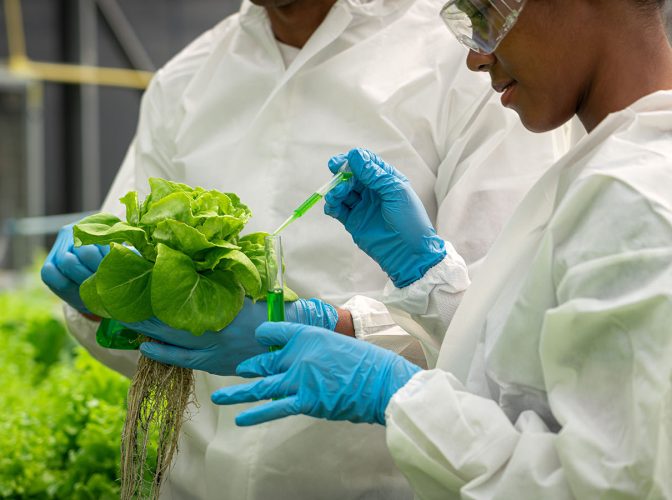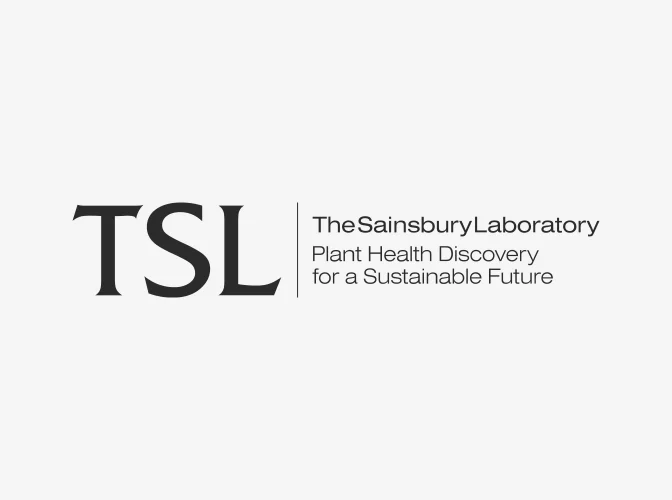
The importance of Plant Science
Plants are the foundation for virtually every ecosystem and agricultural system on Earth. A fundamental understanding of how plants grow and develop is therefore paramount for the long-term security of a sustainable supply of food and other plant products, such as fuel, fibres and building materials.
The study of plant biology is being transformed by the new scientific and technical resources becoming available to scientists. These include high-throughput DNA sequencing, new imaging methods, increasingly sophisticated genetic tools, and refined chemical interventions. The data derived from these approaches has opened the way for predictive computational models, which are essential for understanding the dynamic, self-organising properties of plants.

Creating centres of Plant Science research
The Sainsbury Laboratory comprises two highly collaborative plant biology research centres in the UK. Funded by The Gatsby Foundation, the Laboratory provides plant scientists with state of the art technologies, enabling them to gain an integrated understanding of plant development. This sets the stage for a new synthesis that will draw on molecular, cellular, whole plant, and population biology to elucidate how plants are constructed.
The centres provide an outstanding training environment that supports post-graduate students, post-doctoral scientists and early career project leaders. Many scientists who have passed through The Sainsbury Laboratory have continued their careers in prestigious laboratories and institutes around the world.

The Sainsbury Laboratory - Norwich
Located at the University of East Anglia’s Norwich Research Park, the centre was established in 1989. Closely linked to Gatsby and the John Innes Centre (JIC), this laboratory is dedicated to daring, long-term research which will help reduce crop losses to disease.
This site favours daring, long-term research over work that could be equally well carried out elsewhere. The Laboratory is recognised as a centre of excellence for research on mechanisms of plant immunity and pathogenicity, and has a budding reputation for its research in plant pathogenomics.
Groundbreaking work that has arisen from TSL Norwich includes the cloning of the first of the receptor-like protein class of plant resistance genes and the discovery of small interfering RNA (siRNA), the specificity determinant in RNA-mediated gene silencing.
Professor Nick Talbot
Executive Director
Understanding how fungi are able to cause disease in plants, specifically one of the world’s most devastating diseases called rice blast.
Professor Jonathan Jones
Group Leader
How plants resist plant pathogens, and how pathogens suppress resistance.
Professor Sophien Kamoun
Group Leader
Plant-microbe interactions particularly those involving oomycete pathosystems
Wenbo Ma
Group Leader
Virulence function and evolution of pathogen effectors in order to understand mechanisms underlying plant immunity and microbial pathogenesis.
Dr Matthew Moscou
Group Leader
Understanding the genetic architecture underlying non-host resistance.
Professor Cyril Zipfel
Group Leader
Receptor kinase-mediated innate immunity in plants

The Sainsbury Laboratory - Cambridge University
The Sainsbury Laboratory Cambridge University, opened in 2011, and accommodates up to 150 scientists, technicians and support staff. The Laboratory supports research at the frontiers of knowledge in plant science, addressing some of the greatest challenges of the 21st century including DNA sequencing, developing genetic tools, and refining chemical interventions.
TSL Cambridge is our largest ever commitment in plant science. Set within the inspirational grounds of Cambridge University’s Botanic Garden, the focus of the Laboratory is to elucidate the regulatory systems underlying plant growth and development.
Henrik Jönsson
Director and Professor
Developing computational models describing complex processes at the cellular level.
James Locke
Deputy Director and Professor
Understanding how cells respond to environmental signals.
Elliot Meyerowitz
Distinguished Research Associate
Investigating how shoot tips produce organs in regular patterns.
Madelaine Bartlett
Research Group Leader
The molecular underpinnings of plant diversity: Which genes control the development of plants? And how have these genes changed over the course of evolution?
Alexander Jones
Research Group Leader
Investigating the patterns and dynamics of plant hormones using fluroescent biosensors.
Ottoline Leyser
Research Group Leader
Understanding the role of plant hormones, such as auxin, in plant developmental plasticity.
Edwige Moyroud
Research Group Leader
Investigating mechanisms that account for pattern formation in petals at the molecular, cellular, biophysical and ecological levels.
François Nédélec
Research Group Leader
Studying cell morphogenesis and developmental biology.
Katharina Schiessl
Career Development Fellow
Investigating how novel plant organs of diverse form and function can be generated.
Sebastian Schornack
Research Group Leader
Investigating the symbiotic processes between microbes and plants.
Sarah Robinson
Research Group Leader
Investigating how plant development (cell division and cell expansion) is controlled.
Renske Vroomans
Career Development Fellow
Investigating long-term processes in plant development using evolutionary developmental biology (evo-devo) models.
Chris Whitewoods
Career Development Fellow
Understanding how plants pattern themselves in three dimensions.
The Sainsbury Laboratory's results
The study of plant biology is being transformed by the new scientific and technical resources made available to scientists through centres like The Sainsbury Laboratory, and the number and the quality of research outputs continues to be very high year on year.
Many of the Group Leaders consistently appear in the annual list of highly cited researchers that recognises world-class researchers and their exceptional research performance of multiple highly cited papers that rank in the top 1% by citations for the research field.
